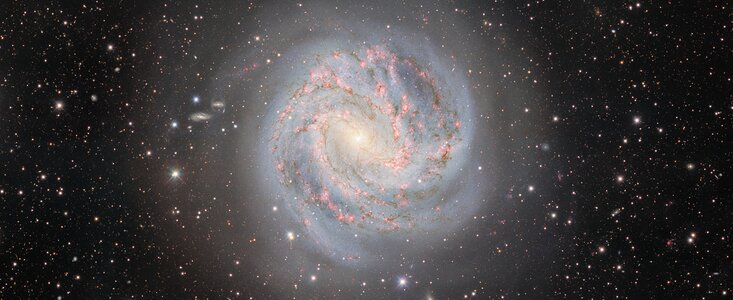Dark Energy Camera Spies the Outskirts of the Swirling Southern Pinwheel Galaxy [View all]
The picturesque spiral arms of Messier 83 exhibit a magnificent display of star formation in new image released by NSF NOIRLab
 Twelve million light-years away lies the galactic masterpiece Messier 83, also known as the Southern Pinwheel Galaxy. Its swirling spiral arms display a high rate of star formation and have been host to six observed supernovae. This image was captured with the Department of Energy-fabricated Dark Energy Camera, mounted on the U.S. National Science Foundation Víctor M. Blanco 4-meter Telescope at Cerro Tololo Inter-American Observatory in Chile, a Program of NSF NOIRLab.
Twelve million light-years away lies the galactic masterpiece Messier 83, also known as the Southern Pinwheel Galaxy. Its swirling spiral arms display a high rate of star formation and have been host to six observed supernovae. This image was captured with the Department of Energy-fabricated Dark Energy Camera, mounted on the U.S. National Science Foundation Víctor M. Blanco 4-meter Telescope at Cerro Tololo Inter-American Observatory in Chile, a Program of NSF NOIRLab.
Messier 83, also known as the Southern Pinwheel Galaxy, is one of the most prominent spiral galaxies in the night sky. It’s named for its resemblance to the Pinwheel Galaxy and spans around 50,000 light-years, making it much smaller than the Milky Way galaxy, although it has a higher rate of star formation, as evidenced by the striking bursts of pink throughout its spiral arms. This display of intense starburst activity likely results from a past merger with another galaxy.
This image was captured with the Department of Energy-fabricated Dark Energy Camera (DECam), mounted on the U.S. National Science Foundation Víctor M. Blanco 4-meter telescope at Cerro Tololo Inter-American Observatory (CTIO), a Program of NSF NOIRLab.
Between 1750 and 1754, French astronomer Nicolas-Louis de Lacaille was studying the night sky with the aim of determining the distances to the planets. During this period he observed and cataloged 10,000 stars and identified 42 nebulous objects, including Messier 83, which he discovered in 1752 during his expedition to the Cape of Good Hope.
In 1781 Charles Messier added it to his famous catalog, describing it as a “nebula without stars,” reflecting the limited knowledge of galaxies at the time. It wasn’t until the 20th century, through the work of Edwin Hubble, that astronomers realized objects like Messier 83 are actually other galaxies far outside the Milky Way.
https://noirlab.edu/public/news/noirlab2429/
